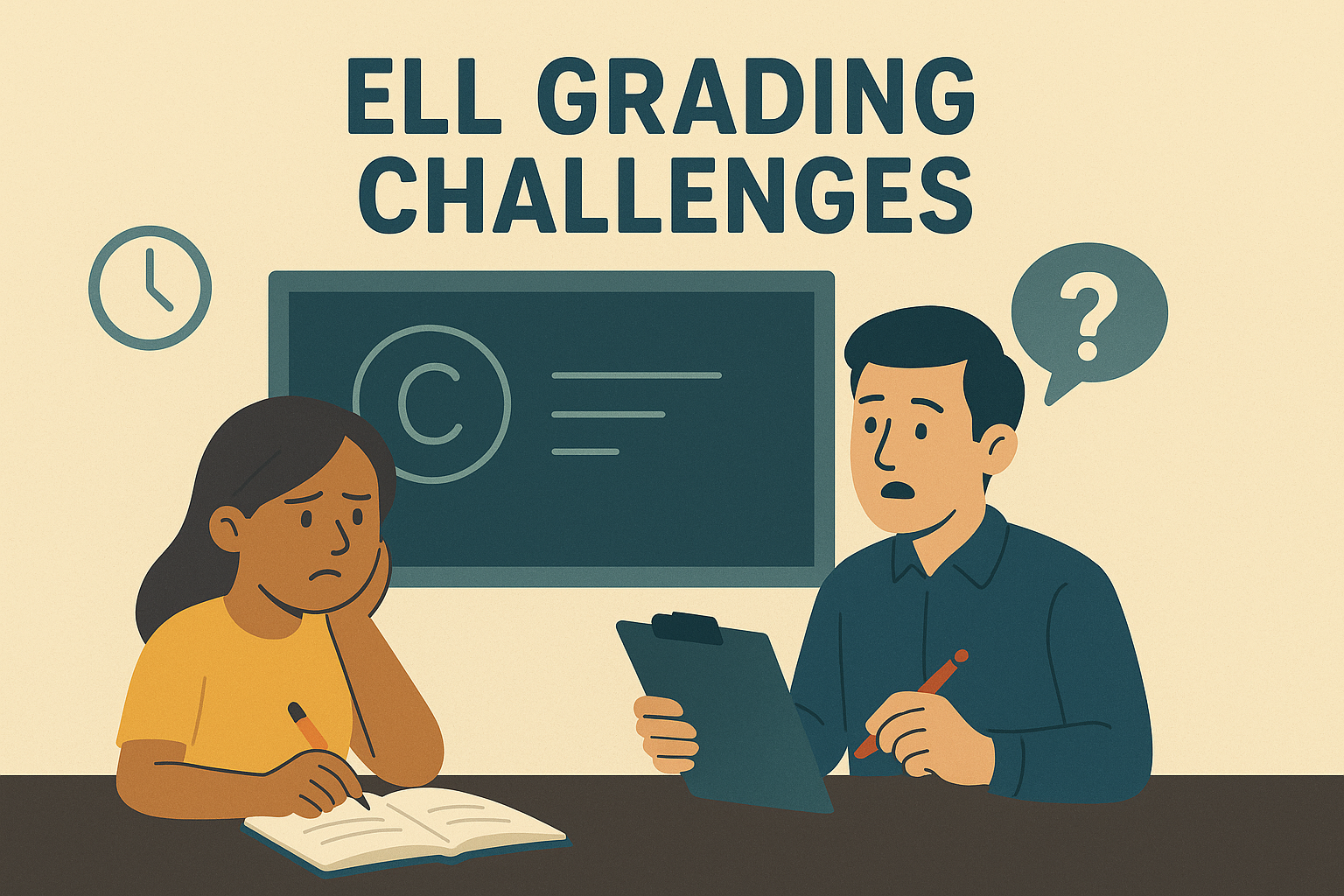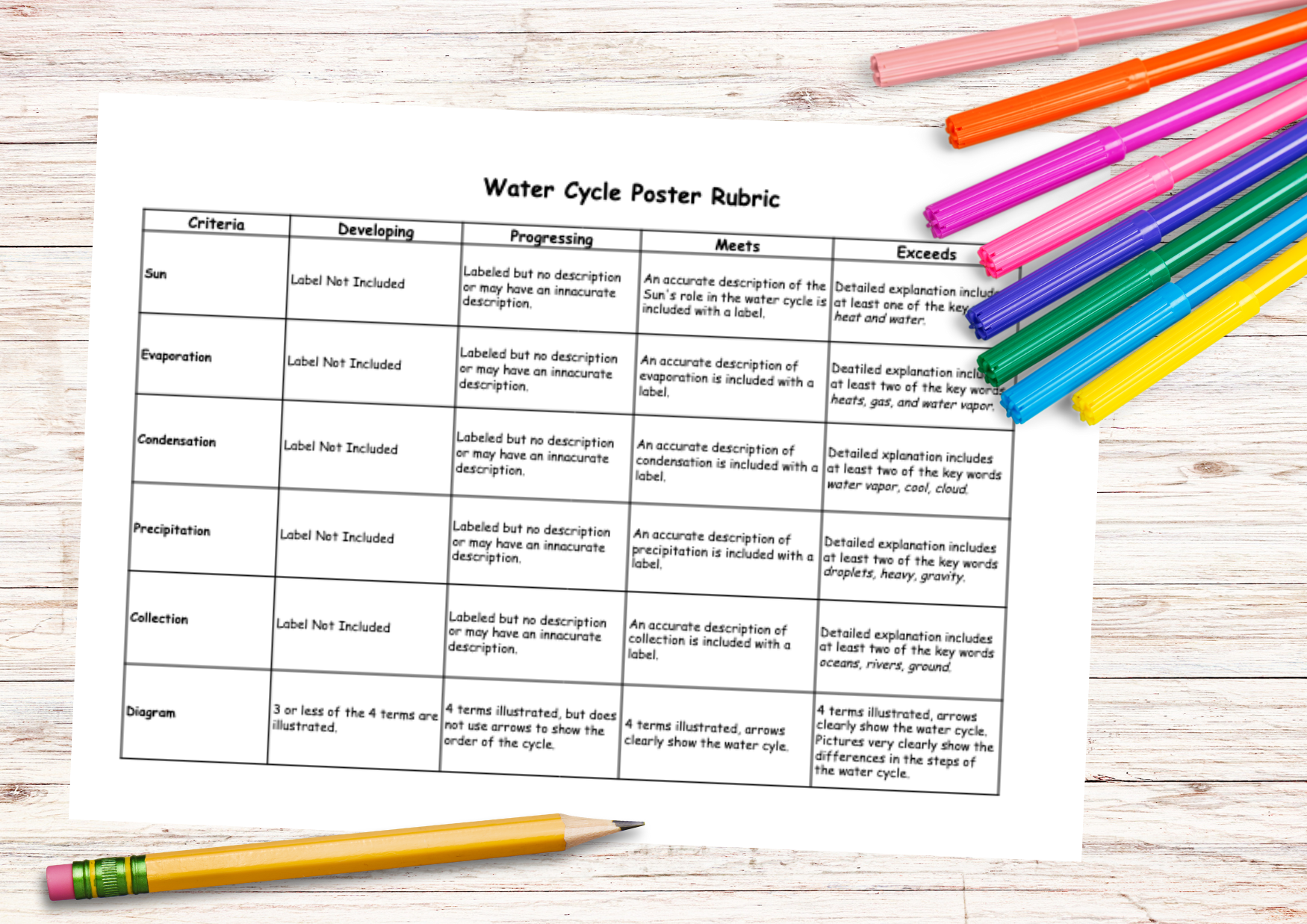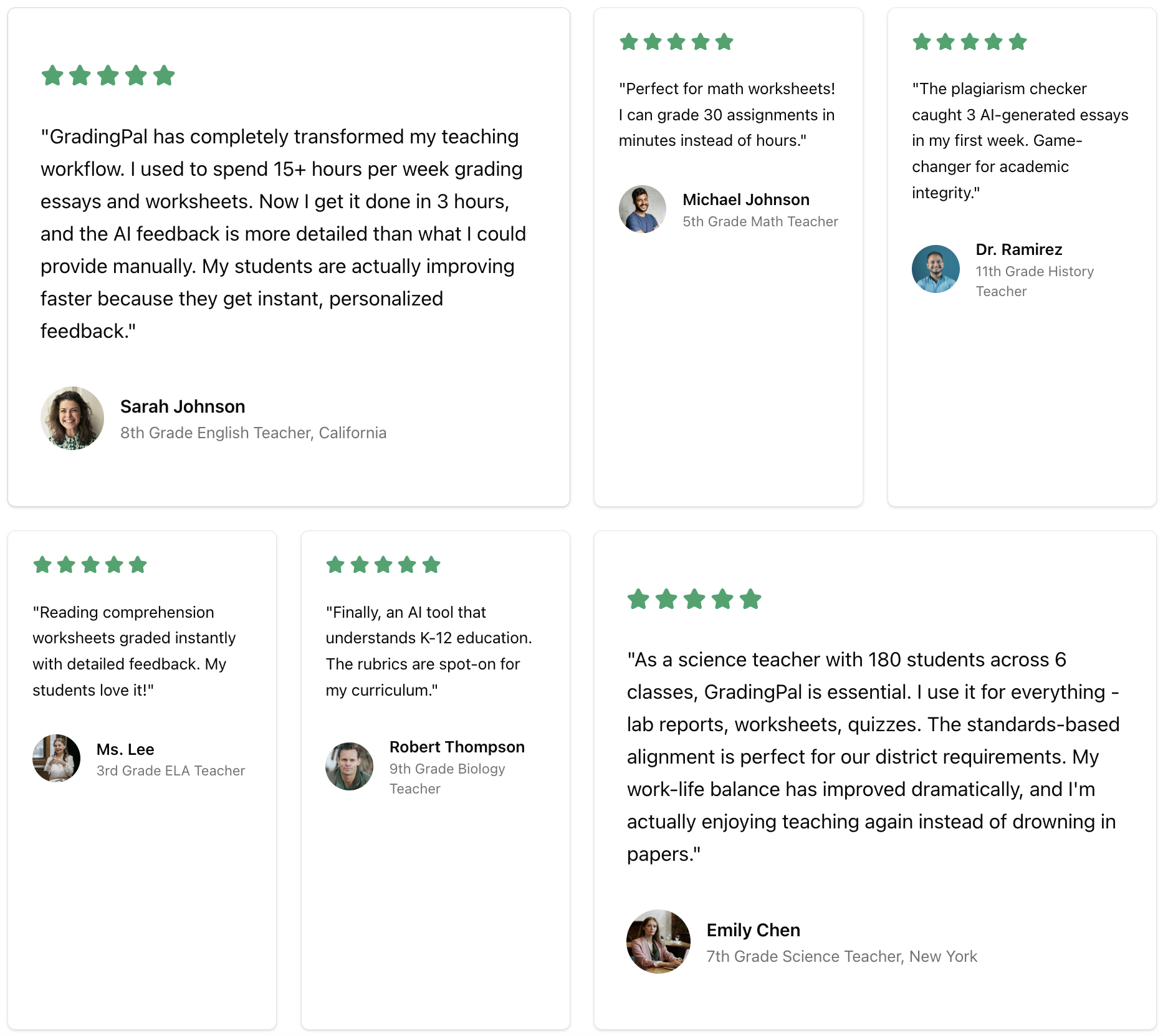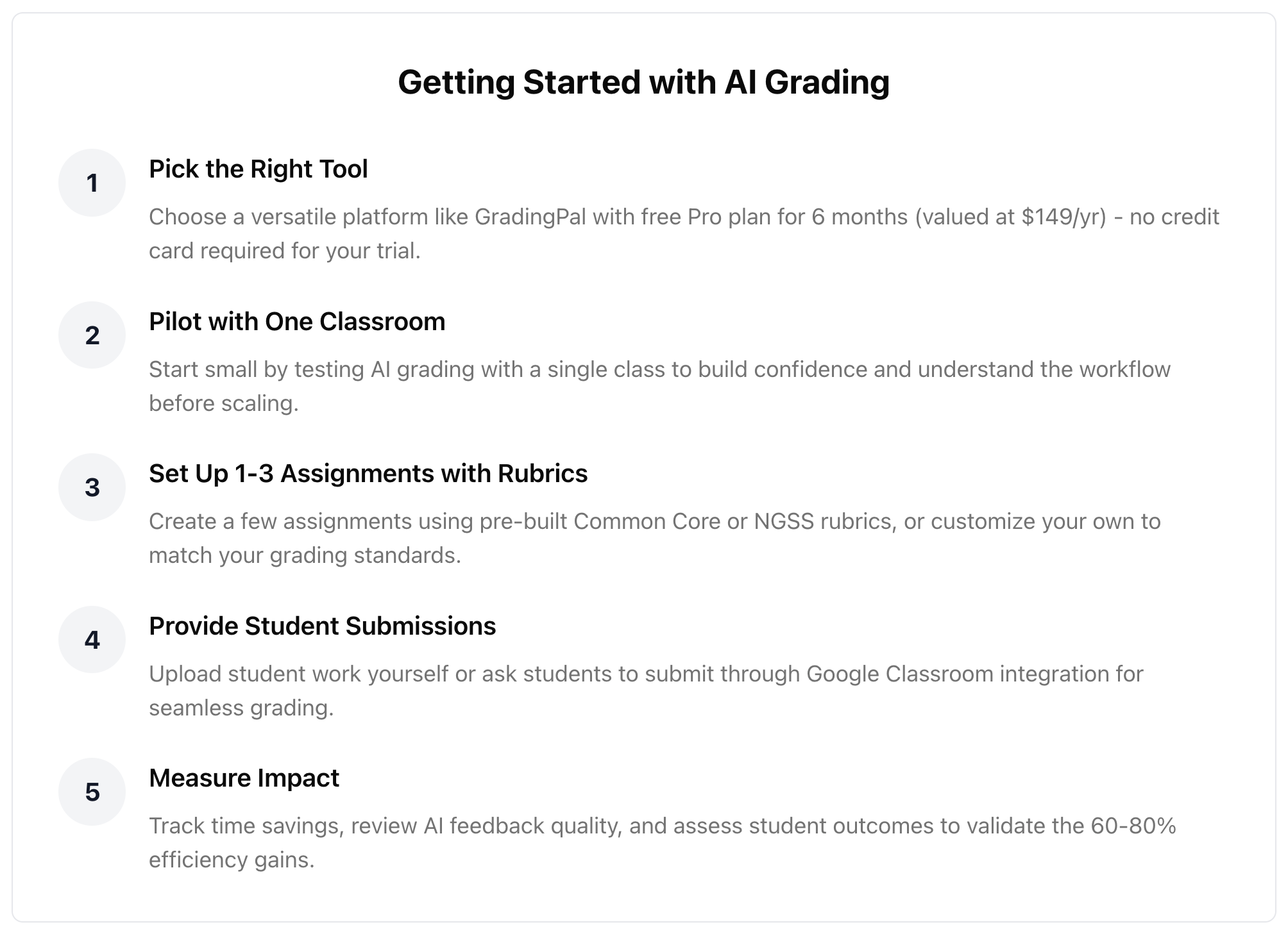Adapting Grading for Diverse Learners in K-12 Classrooms
In diverse K-12 classrooms across the USA, tailoring assessments for English Language Learners (ELL) and special needs students is crucial for inclusive education, yet 52% of teachers report challenges in adapting grading without bias or extra workload, per a 2025 EdWeek survey. This gap can hinder student progress, particularly under standards like Common Core and NGSS, where equitable feedback drives mastery. AI-powered tools like GradingPal enable flexible AI rubrics that customize scoring for diverse learners, promoting inclusive K-12 grading strategies without overwhelming educators. In this post, discover how to adapt grading for ELL and special needs students using AI, backed by 2025 studies on inclusive grading practices. With GradingPal's free Pro plan (valued at $19/mo or $149/yr), unlimited rubric customization is yours for 6 months - no credit card needed. Empower your classroom with equitable, time-saving assessments that support every learner.
Table of Contents
- 1. The Importance of Inclusive Grading for Diverse Learners in K-12
- 2. Challenges in Grading ELL Students: Language Barriers and Beyond
- 3. Adapting Assessments for Special Needs Students in K-12
- 4. How Flexible AI Rubrics Promote Inclusive Grading Strategies
- 5. Real Teacher Stories: Success with AI for Diverse Learners
- 6. Getting Started: Tailor Grading for Inclusive K-12 Classrooms
The Importance of Inclusive Grading for Diverse Learners in K-12
Inclusive grading strategies are foundational to equitable K-12 education, ensuring all students - regardless of language proficiency or special needs - receive fair, supportive assessments. A 2025 MentalUP study of 1,800 US educators found that adaptive grading boosts outcomes by 32% for diverse learners, fostering confidence and mastery in subjects like math worksheets or reading comprehension. Without inclusivity, traditional methods often disadvantage ELL students, who comprise 10% of K-12 enrollment (Coursebox, 2025), by penalizing language over content, or special needs students by ignoring accommodations like simplified rubrics.
In practice, inclusive K-12 grading involves flexible tools that align with IEPs and Common Core, providing personalized feedback without added teacher burden. AI platforms like GradingPal excel here, offering customizable rubrics that adjust criteria - e.g., weighting content over grammar for ELL essays - while saving 60-80% grading time. This promotes diverse learner success in formative assessments, from kindergarten worksheets to high school projects. By prioritizing equity, teachers create supportive environments, as emphasized in a 2025 EdWeek report on reducing achievement gaps through adaptive tech. GradingPal's FERPA-compliant features ensure privacy, making it a go-to for inclusive strategies.

Challenges in Grading ELL Students: Language Barriers and Beyond
Grading ELL students in K-12 presents unique hurdles, where language barriers often overshadow content mastery, leading to inequitable outcomes. According to a 2025 TutorFlow analysis, 48% of US teachers struggle with assessing ELL work in ELA or science, deducting points for grammar in essays or vocabulary in math worksheets, which doesn't reflect true understanding. This can demotivate learners, with 35% of ELL students showing lower engagement in formative assessments (FETC, 2025).
Beyond language, cultural differences and varying proficiency levels complicate fair grading - e.g., a 3rd-grade ELL might excel in conceptual math but struggle with word problems. Traditional rubrics fail to adapt, exacerbating gaps under NGSS or Common Core. AI tools address this by allowing flexible criteria, like emphasizing visuals in projects or bilingual feedback. GradingPal's AI rubrics simplify this, scoring a reading comprehension worksheet with comments like "Strong inference - focus on key vocabulary for clarity," tailored for ELL needs. This inclusive approach, supported by 2025 MentalUP data, improves retention by 28% while reducing teacher workload. For K-12 educators, overcoming these challenges means embracing tech for equitable, language-sensitive grading strategies.

Adapting Assessments for Special Needs Students in K-12
Special needs students in K-12 require adaptive assessments to thrive, but 55% of teachers cite time constraints as a barrier to customizing grading, per a 2025 Coursebox report. Conditions like dyslexia or ADHD demand flexible rubrics - e.g., extended time for quizzes or simplified criteria for worksheets - aligned with IEPs and standards-based grading. Without adaptation, these students face unfair penalties, widening gaps in mastery tracking.
Inclusive K-12 grading strategies involve breaking down tasks: for a 7th-grade science project, prioritize conceptual understanding over written length. AI enhances this by automating modifications, such as voice-to-text integration or weighted scoring for effort in math worksheets. GradingPal's platform supports this with drag-and-drop rubrics, generating feedback like "Excellent data analysis - use bullet points for organization next time," fostering growth without bias. A 2025 EdWeek survey shows AI-adapted assessments improve special needs outcomes by 40%, promoting equity in diverse classrooms. By integrating with Google Classroom, GradingPal streamlines these adaptations, saving 60-80% time for teachers focused on individualized support.

How Flexible AI Rubrics Promote Inclusive Grading Strategies
Flexible AI rubrics are game-changers for inclusive K-12 grading, allowing teachers to tailor criteria for ELL and special needs students effortlessly. GradingPal's AI builder generates rubrics in minutes, adjusting weights - e.g., 50% content, 20% language for ELL essays - or incorporating accommodations like multimedia options for projects. This ensures Common Core alignment while promoting equity, as noted in a 2025 FETC study where AI rubrics reduced disparities by 37%.
For diverse learners, AI analyzes patterns: in reading comprehension worksheets, it flags vocabulary issues for ELLs with targeted feedback, or simplifies scoring for special needs via OCR for handwritten work. Analytics reveal trends, like 60% of special needs students excelling in visuals, guiding refinements. Unlike rigid tools, GradingPal's flexibility supports mastery grading, with 75% of users reporting enhanced inclusivity (MentalUP, 2025). The free Pro plan (valued at $19/mo or $149/yr) offers unlimited rubrics for 6 months, empowering teachers to implement these strategies across subjects. This tech-driven approach transforms grading into an inclusive tool for all K-12 learners.

Real Teacher Stories: Success with AI for Diverse Learners
K-12 educators using GradingPal share transformative experiences in adapting grading for diverse learners.
Ms. Hernandez, a 4th-grade teacher in Florida with a high ELL population, customized rubrics for math worksheets. "AI weighted problem-solving over language, boosting scores by 35%," she says. "Feedback like 'Great strategy - practice English terms' encouraged growth without discouragement." This mirrors TutorFlow's 2025 findings on AI's equity boost.
Mr. Kim, a special education specialist in Illinois, adapted assessments for ADHD students in science labs. "Flexible rubrics focused on concepts, not speed, with analytics showing 45% mastery gains," he shares. "GradingPal saved me hours, allowing more one-on-one time." EdWeek's 2025 report confirms such tools enhance inclusive strategies.
These stories highlight GradingPal's 97% satisfaction rate (Coursebox, 2025), proving AI's role in equitable grading for ELL and special needs students. From essays to projects, teachers foster inclusion effortlessly. See more teacher stories.

Getting Started: Tailor Grading for Inclusive K-12 Classrooms
Implement inclusive K-12 grading strategies with these steps using GradingPal.
- Sign Up Free: Get Pro access (valued at $19/mo or $149/yr) for 6 months - no credit card needed.
- Customize Rubrics: Use AI to adapt criteria for ELL (e.g., language flexibility) or special needs (e.g., effort weighting).
- Upload Assignments: Process worksheets or essays with OCR for accessible scoring.
- Generate Feedback: Deliver personalized, growth-oriented comments aligned with IEPs.
- Analyze Outcomes: Use dashboards to track equity and refine strategies.
GradingPal's free Pro plan makes tailoring assessments seamless, saving 60-80% time while promoting inclusive education. Claim your free Pro plan today and create equitable classrooms for diverse learners.

Ready to Create Inclusive Classrooms for All Learners?
Get our free Pro plan (valued at $149/yr) for 6 months - adapt grading for ELL and special needs students with flexible AI rubrics. No credit card required.
No credit card required • Free for US teachers • Set up in minutes